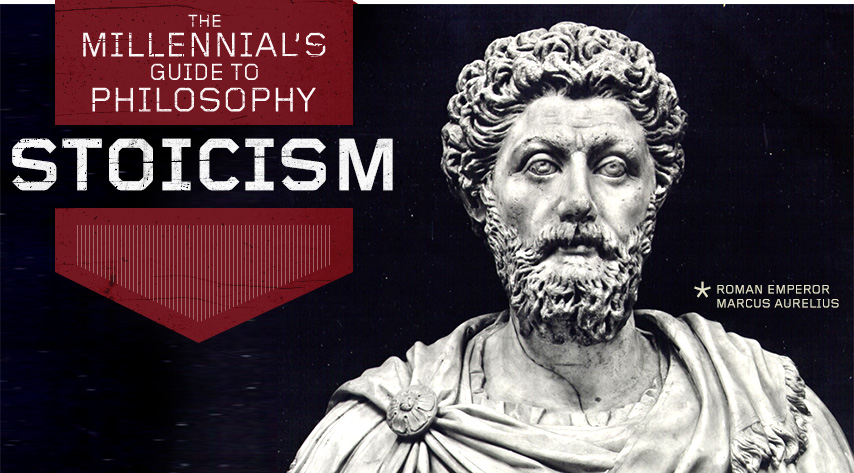What do rugged cowboys, hard-boiled detectives, tough-as-nails drill sergeants, Jedi knights, Spock from Star Trek, and your grandfather all have in common?
More likely than not, they’re all Stoics – adherents of an old Greek philosophy which has not only survived but flourished over the past 2,300 years of its existence. To this day, Stoicism is making appearances in the actions and words of every tough guy out there, from the sarcastic monologues of John McClane to Clint Eastwood’s thousand-yard squint.
Who Thought It Up:
While credit obviously needs to go to Zeno of Citium for coming up with the philosophy, it was legendary Roman emperor Marcus Aurelius (you might remember Joaquin Phoenix murdering him in the first few minutes of Gladiator) who did the most by compiling all Stoic thought into a comprehensive and concrete tome. To this day, Marcus Aurelius’s Meditations serves not only as the be-all-end-all guide to Stoicism but as inspiration to philosophers, writers, and world leaders.
What It’s All About:
Fate
Life, most Stoics would argue, is like a river with a strong current. Regardless of how hard you paddle against it, you’re going to be pulled inexorably along to the end and there’s nothing you can do to change that. The only thing you can do is decide whether or not you’re going to handle it with good grace and dignity.
Hardship, pain, suffering, and ultimately, death – these are all parts of life that Stoicism would consider as natural as they are inevitable. Taking a highly fatalistic approach to all of existence’s trials and tribulations, both philosophies maintain that since you can’t exercise any control over them, you should instead spend your time in the struggle to control yourself.
This is where the term “Stoic”, in reference to indifference to hardship, originates. It’s the mentality that all of life’s ups and downs should be taken in stride.
So how do we accomplish this?
Well, that’s where discipline comes in.
Discipline
“The superior man is quiet and calm, waiting for the appointments of Heaven… The superior man is all-embracing and not partial… When the superior man eats he does not try to stuff himself; at rest he does not seek perfect comfort; he is diligent in his work and careful in speech… This is the kind of person of whom you can say, ‘he loves learning.’”
-The Analects, Confucius
The early disciples of Stoicism understood that one does not simply flip a switch somewhere in the mind to shut off emotionalism or irrationality. Inner peace was a battle to be fought anew every day, and rigid self-discipline, meditation, and study were all essential in the pursuit of being what the Stoics dubbed “a true man”. It’s this language, in fact, which has probably been the longest lasting element – the idea that there are certain things “a man does”, or certain “manly” virtues or actions “that make a man a man.”
Natural Order
One might assume that this deeply dispassionate ideal the philosophy strives for is driven out of some kind of distaste for the world, and while the staunchest critics of Stoicism might still argue that, the truth is that it actually cites itself as striving for harmony with the universe. Again, we’re talking about the acceptance of all of life’s ups and downs as just natural parts of the ride, nothing to be upset or angry over. The old Stoic tome The Enchirion of Epicitus offers a clear (if somewhat blunt) example of this:
“With regard to whatever objects give you delight, are useful, or are deeply loved, remember to tell yourself of what general nature they are, beginning from the most insignificant things. If, for example, you are fond of a specific ceramic cup, remind yourself that it is only ceramic cups in general of which you are fond. Then, if it breaks, you will not be disturbed.”
Individualism
In spite of that emphasis on natural order, Stoicism does tend to lend itself to an individualistic standpoint, the operating principle here being that it’s much easier to be ruled by your base appetites and your passions than your intellect and reason. The private eye trying to stand up against a corrupt, crime-ridden city, the cowboy trying to tame the lawless wild west – this is the cultural legacy Stoicism helps shape. As Marcus Aurelius himself put it: “Only attend to thyself, and resolve to be a good man in every act which thou doest; and remember… “
What It Means For Us:
For all our glorification of Stoic ideals, from John Wayne and Humphrey Bogart to Captain America and Ron Swanson, we’re nevertheless left with some pretty big shoes to fill here. And if taking a beating from the universe with a smile on your face and a spring in your step doesn’t sound like your idea of a good (or sane) life, then this particular worldview probably isn’t for you. Of course, even the most dedicated devotee of Stoicism will tell you that just because something isn’t easy doesn’t mean that it isn’t right. That is the core essence of Stoicism: the belief in the existence of things greater than pleasure or pain – that a man who is driven through life by the fear of the inevitable never truly lives. In the tough times after college the idea that you can rise above all the petty worries and woes has got to be something that resounds with each and every one of us.
As good a place as any to get started is the development of your code: a set of personal and absolute values which surpass in importance everything else in the world (in fact, Primer’s own Andrew Snavely has a great article on doing just that). A personal code isn’t just about showcasing what your values are, either – it’s a measurement system for how close you can get to living out your beliefs (or how far you stray). This is all the more important in your 20s, when it’s easy to get overwhelmed with the loss of the sense of direction that college once offered.
Being able to roll with life’s punches isn’t about being apathetic to hardship or ignoring its existence, but in fundamentally understanding that there exist things in life beyond your scope of control, that you can either stress about the things you can’t change or devote yourself to the things you can (yourself being first and foremost on that list).
We’re talking about a reasonable philosophy created to not only make sense in an unreasonable world, but to help the adherent overcome it. And if that’s not a place to start, I don’t know what is.
Required Reading:
Meditations by Marcus Aurelius – As stated above, Meditations has become the epitomizing work of Stoic philosophy. Aurelius’ simple observations on life and humanity, while written solely for himself, have proven cuttingly insightful for countless individuals over the course of the centuries.
The Enchiridion of Epictetus by Arrian of Nicomedia – A Stoic text predating even Meditations, The Enchiridion serves up helpful metaphors and maxims on delayed gratification, self-control, moderation, and acceptance.
Analects by Confucius – Although separated by over 5,000 miles, the philosophy of Confucianism developed at roughly the same time as Stoicism and, with few a exceptions, overlaps almost perfectly with its Western counterpart. Similarly emphasizing obligation, humility, self-discipline, and the temporality of all things, Analects makes a perfect companion piece to any study of Stoicism.
The Millennial’s Guide to Philosophy
- The Millennial's Guide to Philosophy: Stoicism
- The Millennial’s Guide to Philosophy: Epicureanism
- The Millennial’s Guide to Philosophy: Nietzsche
- The Millennial’s Guide to Philosophy: Postmodernism
- The Millennial’s Guide to Philosophy: Confucianism
- The Millennial’s Guide to Philosophy: Taoism
- The Millennial’s Guide to Philosophy: Sartre
- The Millennial’s Guide to Philosophy: Kierkegaard
- The Millennial’s Guide to Philosophy: Camus
















![It’s Time to Begin Again: 3 Uncomfortable Frameworks That Will Make Your New Year More Meaningful [Audio Essay + Article]](https://www.primermagazine.com/wp-content/uploads/2025/01/begin_again_feature.jpg)